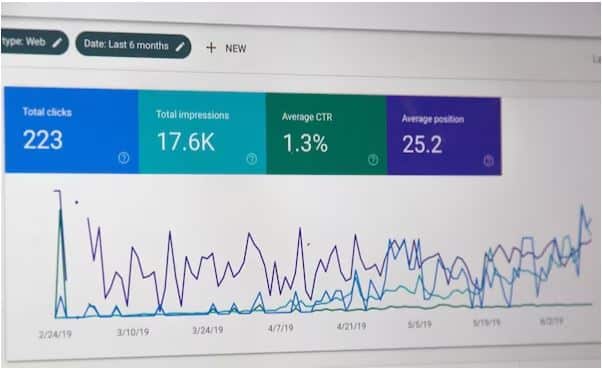

Every Website Owner Should Know These SEO KPIs - Big Data Analytics News
source link: https://bigdataanalyticsnews.com/seo-kpis-website-owner-should-know/
Go to the source link to view the article. You can view the picture content, updated content and better typesetting reading experience. If the link is broken, please click the button below to view the snapshot at that time.
Having a website doesn’t guarantee success. The digital landscape is too complex and competitive for simply having a website alone. Website owners must employ effective search engine optimization (SEO) strategies to truly thrive and attract valuable organic traffic. Monitoring SEO key performance indicators (KPIs) is an essential practice to assess the effectiveness of these strategies.
Importance of Monitoring SEO KPIs
Monitoring SEO KPIs is of utmost importance for website owners due to the following reasons:
- Understanding Performance and SEO Impact: SEO KPIs provide valuable insights into your website’s performance and the direct impact of your SEO efforts. For example, tracking organic traffic lets you understand your optimization strategies’ success in attracting visitors through unpaid search engine results. If you notice a steady increase in organic traffic over time, your SEO efforts improve your website’s visibility.
- Making Data-Driven Decisions: When you monitor SEO KPIs, you can access data to guide your decision-making process. Analyzing these metrics helps you identify areas of strength and weakness in your SEO strategies. For instance, if you notice a high conversion rate on specific landing pages, you can replicate the successful elements on other pages to improve overall conversion rates.
- Effective Resource Allocation: Monitoring SEO KPIs enables you to allocate your resources effectively. You can allocate more time, effort, and budget toward those strategies by identifying the areas that yield the best results.
- Prioritizing Actions: SEO KPIs help you prioritize actions based on the most critical metrics for your business. It directs you to make strategic decisions and take actions that directly impact achieving your goals.
- Tracking Progress and Setting Realistic Goals: Regularly analyzing and comparing metrics identifies trends, patterns, and areas for improvement. Tracking your SEO KPIs helps you set realistic goals for continuous improvement. Setting specific targets based on historical data and industry benchmarks allows you to measure your success and strive for meaningful progress.
SEO KPIs to Master
Pay attention to these SEO KPIs.
1. Organic Traffic
Organic traffic pertains to the visitors who arrive at your website through unpaid, natural search engine results. This metric indicates the effectiveness of your website’s visibility in search engine rankings. Doing this allows you to measure the impact of your SEO efforts in attracting relevant visitors to your website. It is crucial to analyze trends, identify traffic sources, and track the performance of different landing pages to optimize your content and improve organic traffic over time.
2. Conversion Rate
In the pursuit of running a profitable business, success extends beyond driving traffic to your website and providing informative content.
For website owners, monitoring the conversion rate becomes an essential SEO KPI. By utilizing Google Analytics conversion tracking tags, you can gather and organize data to determine the true sources of your conversions. Which web pages are effectively generating leads rather than mere visits? Analyzing this data allows you to gain insights into how to refine your future efforts and focus on strategies that drive optimal results.
Understanding your conversion rate empowers you to make informed decisions and optimize your website’s performance for improved profitability.
3. Click-Through Rate (CTR)
Click-through rate (CTR) measures the number of users who click on your website’s link when it appears in search engine results.
What makes it essential for website owners?
CTR is vital because it helps you assess the effectiveness of your SEO efforts in reaching the right audience. It lets you identify areas where you can optimize your page snippets to attract more users to click on your results rather than your competitors’.
To get CTR, divide the number of clicks your snippet or page receives by the number of times it is shown in search results. For instance, if your webpage has five clicks and 100 impressions, your CTR would be 5%.
4. Return on Investment (ROI)
ROI measures the profitability of your SEO efforts. It quantifies the return you generate from the resources invested in SEO activities such as content creation, link building, and website optimization. It identifies the effectiveness and efficiency of your SEO campaigns and guides the decision-making process regarding resource allocation. Calculating ROI involves analyzing the revenue generated from organic traffic, comparing it with the costs incurred, and adjusting your strategies to maximize profitability.
5. Keyword Ranking
Monitoring keyword rankings allows you to assess the visibility and competitiveness of your website in relation to targeted keywords. It helps identify opportunities for backlink building, optimize your content, and adjust your SEO strategies to enhance your website’s visibility in search results. Focus not only on your website’s ranking for high-volume keywords. Pay attention to long-tail keywords highly relevant to your target audience.
Key Takeaways
Monitor essential SEO KPIs to gauge your progress. However, it goes beyond tracking metrics. It requires a commitment to staying informed about the latest SEO trends continuously. This knowledge equips you with insights into where to steer your strategy next, ensuring you remain adaptable and responsive in the ever-changing world of SEO.
- Measure campaign effectiveness in attracting relevant visitors to your website through unpaid, natural search engine results.
- Use conversion tracking tags to gather data and optimize web pages for better lead generation and profitability.
- Optimize page snippets to attract more clicks and evaluate your SEO strategy in reaching the right audience.
- Use ROI analysis to guide resource allocation and adjust strategies for maximum profitability.
- Identify opportunities for optimization and backlink building to enhance your website’s ranking and visibility in search results.
--
Subscribe to our Newsletter
Stay up-to-date with the latest big data news.
Recommend
About Joyk
Aggregate valuable and interesting links.
Joyk means Joy of geeK
